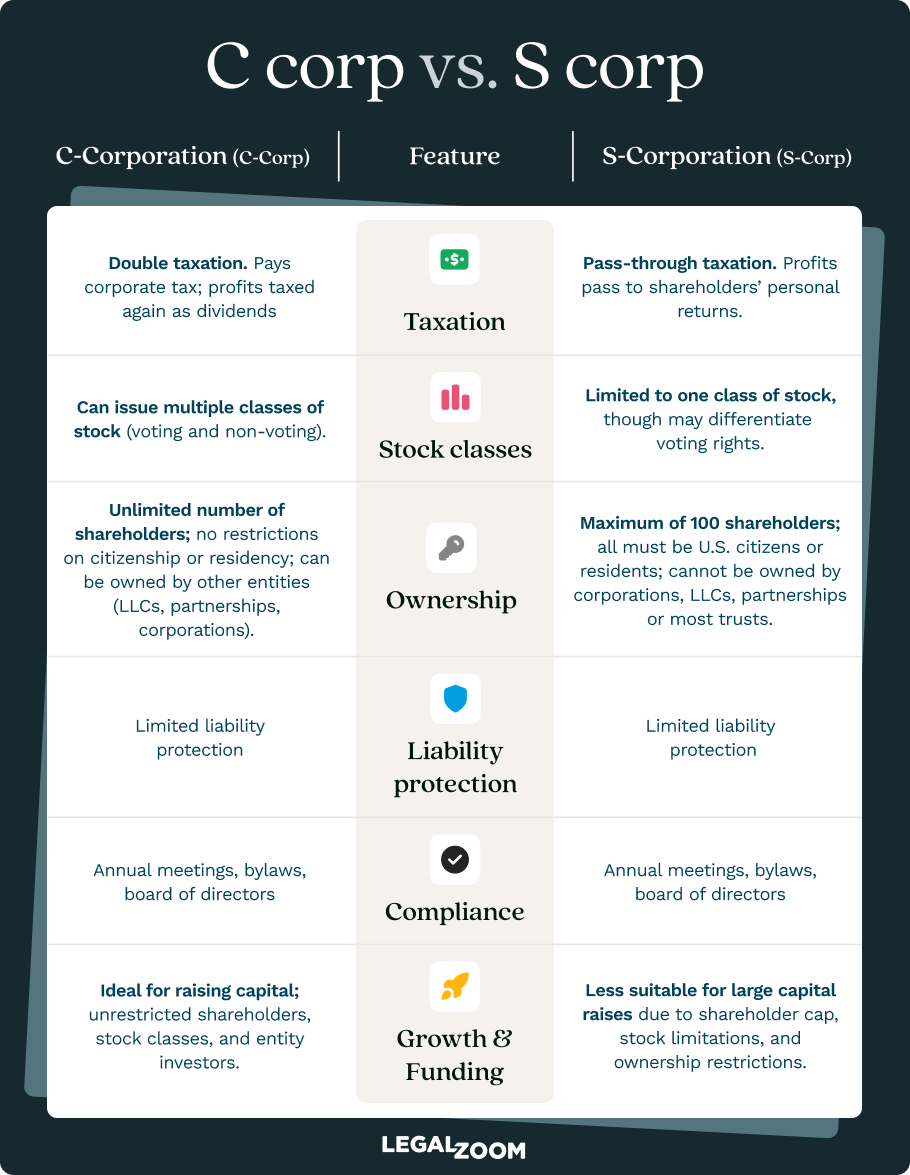Starting a new corporation requires understanding Kansas-specific requirements to help ensure a smooth formation process. This comprehensive guide provides step-by-step instructions for forming a corporation in the Sunflower State, including required paperwork, filing procedures, costs, and ongoing compliance requirements.
Why incorporate in Kansas?
Forming a corporation in Kansas offers several significant advantages for business owners:
- Limited liability protection. A corporation's liability is limited to the corporation's assets, which means that a creditor cannot use the shareholders' personal assets to satisfy the corporation's financial obligations. This protection shields your personal assets from business debts and legal claims.
- Business incentives and tax benefits. Eligible Kansas corporations may benefit from various business incentives and tax advantages offered through state programs.
- Business credibility. Incorporating in Kansas enhances your business' professional image and credibility with customers, vendors, and financial institutions. The "Inc." or "Corp." designation signals stability and permanence.
How do I incorporate in Kansas?
The Kansas incorporation process involves several key steps.
Step 1: Choose a corporate name
Before filing articles of incorporation, you must ensure that your proposed corporation name is available and compliant with the state.
Here are the the Kansas corporate name requirements:
- Must include the words "company" or "corporation" or the abbreviations "corp.," "inc.," "co.," or "ltd."
- Must be distinguishable from names of other business entities on file with the Kansas Secretary of State
- Cannot imply governmental affiliation or suggest activities not permitted under Kansas law
Next, conduct a name availability search with the Kansas Secretary of State. The online database allows you to search existing business names to avoid conflicts. You should also search the Kansas trademark database as well as any federal trademarks on file with the US Patent and Trademark Office.
If your name is available but you're not quite ready to file your articles of incorporation, you can reserve your chosen name for 120 days by downloading Form 17-7923, “Temporary Reservation of Business Entity Name,” and mailing it, along with the $35 filing fee, to the Kansas Secretary of State:
Memorial Hall, 1st Floor
120 S.W. 10th Avenue
Topeka, KS 66612-1594
Step 2: Appoint a registered agent in Kansas
Every Kansas corporation must maintain a registered agent to receive legal documents and official correspondence on behalf of the corporation. The following are the requirements:
- Must be an individual who resides in Kansas, or a corporation, limited partnership, limited liability company, or business trust formed or authorized to do business in Kansas
- Can be a corporation serving as its own registered agent
- Must maintain a Kansas street address (not a P.O. box) that is open during normal business hours
- Must have the registered office address match registered agent’s business address
Failure to maintain a proper registered agent can result in penalties and fees as well as negative consequences from the state, which can range from loss of good standing to administrative dissolution of the corporation.
Companies can appoint their own or choose to use professional services, like LegalZoom’s Topeka-based registered agent service.
Step 3: Prepare and file Kansas articles of incorporation
The articles of incorporation establish your corporation as a legal entity in Kansas. This document must be filed with the Secretary of State along with the required filing fee and contain specific information required by Kansas Statute 17-6002.
- Corporate name: It must comply with naming requirements.
- Registered agent information: Give the full legal name and address (no P.O. boxes) of the registered agent.
- Corporate business purpose: You can get specific, but Kansas law allows a general purpose clause that provides maximum flexibility: "The purpose of the corporation is to engage in any lawful act or activity for which corporations may be organized under the Kansas General Corporation Code."
- Stock structure: If your corporation is authorized to issue capital stock, you must note the total number of authorized shares, their class structure, and their par value (or "no par value" designation). There must also be a statement included that describes the rights, preferences, and restrictions for each class.
- Director information: If the powers of the incorporators will terminate after the filing of the articles of incorporation, make sure that the directors’ names and addresses are listed in section eight.
- Incorporator information and signature: Provide the full legal names, addresses, and signatures of all incorporators.
You can file online by visiting the Secretary of State’s “eforms” portal and creating an account. Alternatively, you can download Form 17-6002, “Articles of Incorporation Domestic (Kansas) Corporation,” fill it out, then print and mail it to:
Kansas Secretary of State
Docking State Office Building
915 SW Harrison Street
Topeka, KS 66612
Be sure to include payment for the filing fee.
Online filings are processed within minutes, and once processed, your certified copy of the articles of incorporation can be printed. Mail-in filings may take a few days to process. Certified copies can only be obtained online, so if you mailed your articles of incorporation form, you’ll still need to create an account on the “eforms” portal to get a certified copy.
Step 4: Hold an organizational meeting, set initial directors, and adopt bylaws
After filing articles of incorporation, conduct an organizational meeting to do the following:
- Elect initial directors
- Adopt corporate bylaws
- Appoint corporate officers
- Authorize issuance of stock
- Approve corporate seal and stock certificates
- Establish fiscal year and accounting methods
For this and all future meetings, you must record meeting minutes and keep records on file according to Kansas state law.
Step 5: Obtain an EIN
All Kansas corporations must obtain a federal employer identification number (EIN) from the IRS, even if they don't plan to have employees. You can either apply online on the IRS’ website or use LegalZoom’s streamlined EIN service.
How much does it cost to incorporate in Kansas?
Understanding all the potential costs involved in forming your Kansas corporation helps you budget appropriately and avoid any financial surprises.
- Articles of incorporation: $90 paper filing; $85 online filing
- Name reservation: $35
- Certified copies: $7.50 per copy
- Registered agent change: $35 paper filing (Form 17-7926); $30 online filing
- Federal EIN application: $0–$79 (depending on if you use a service)
- Registered agent services: $0–$300 annually (depending on if you use a service)
- Legal and professional services: Varies based on service provided (e.g., attorney consultation, corporate formation services, accounting setup, etc.)
- Corporate supplies: $0–$250 (optional, for corporate seal, stock certificates, etc.)
What should I do after I incorporate in Kansas?
Completing the incorporation process is just the beginning of your business journey. Several important post-incorporation steps ensure that your Kansas corporation remains compliant and operational.
Appoint officers
Kansas corporations typically have a president, secretary, and treasurer. The number of officers and their titles, duties, selection process, term of office, and more are determined in the corporate bylaws.
Register for state taxes
Register your corporation with the Kansas Department of Revenue for:
- Kansas corporate income tax
- Sales and use tax (if applicable)
- Withholding tax (if you have employees)
Create an account with the Kansas Department of Revenue and fill out the questionnaire. Once completed, the questionnaire results will list what business taxes are applicable.
You may also need to register with the Kansas Department of Labor for unemployment insurance tax.
Obtain any necessary business licenses or permits
Business permits or licenses may be required depending on your business activities and location. There is no state-issued general business license, but certain counties and cities may require one to operate in that location.
Depending on your business activities, you may need:
- Professional licenses (e.g., healthcare, legal, accounting)
- Industry-specific permits (e.g., food service, construction, retail)
- Local business licenses and permits
- Federal licenses (for federally regulated activities)
Open a corporate bank account
Maintain corporate formalities by opening a separate business bank account. You'll typically need a certified copy of your articles of incorporation or your certificate of good standing as proof that your corporation is a legal entity. Additionally, you may need to sign documentation about the nature of your business, provide owner information, and authorize a credit check. Note that requirements vary by financial institution.
File information reports
Known in other states as annual reports, a Kansas information report is filed every two years with the Kansas Secretary of State. Corporations are required to submit an information report.
You can file online by logging into your account on the Secretary of State’s “eforms” portal, or download Form 17-503, 17-505, “Information Report For-Profit Corporation,” fill it out, and mail it to:
Kansas Secretary of State
Docking State Office Building
915 SW Harrison Street
Topeka, KS 66612
Here’s what to remember when filing the information report:
- It must list required information, including current officers, directors, registered agent, business address, and any agricultural land.
- It’s due by April 15 every two years.
- There’s a $110 filing fee for paper forms or $100 filing fee for online submission.
- Failure to submit your articles could result in financial penalties as well as forfeiture of your articles of incorporation or loss of good standing with the state.
Corporation vs. LLC in Kansas: Which fits my business?
The choice between a corporation and limited liability company (LLC) in Kansas should be made based on your business goals, tax preferences, and operational needs.
- Liability protection: Shareholders and members of both entity types are protected from business debts and liabilities.
- Business structure: LLCs have a more flexible operational structure than corporations.
- Compliance and recordkeeping: Corporations have more formal requirements for recordkeeping.
- Tax considerations: C corporations have double taxation at the corporate and shareholder levels, while LLCs default to pass-through taxation, but both may be able to elect S corporation status.
- Information report: Both Kansas LLCs and C corporations must submit an information report every two years.
- Stock options: LLCs cannot issue stocks, while corporations can issue different classes of stock.
- Business licenses and permits: Both entities must obtain the necessary licenses and permits to legally operate in Kansas.
- Investment opportunities: Corporations are typically a more desired option for raising capital from investors and gaining maximum credibility with lenders.
Form your corporation with LegalZoom
Use LegalZoom’s business formation services to create your corporation in Kansas. We can help get your company up and running quickly while making sure all state requirements are met.
FAQs about incorporating in Kansas
Can I file articles of incorporation online in Kansas?
Yes, the Kansas Secretary of State offers online filing for articles of incorporation through the “eforms” portal. Online filing is faster than mail-in filings and provides immediate confirmation of your filing. The online system accepts credit cards and electronic checks for payment.
Do I need a lawyer to incorporate in Kansas?
While Kansas law doesn't require an attorney to form a corporation, legal consultation can be valuable for complex business structures or specific industry requirements. Many entrepreneurs successfully incorporate using online services, like LegalZoom’s business formation service, or by filing directly with the Secretary of State.
What is the difference between S corp and C corp in Kansas?
S corporation and C corporation are types of federal tax designations that dictate how a corporation will be taxed. All corporations are C corporations by default. If it meets the federal requirements, a C corporation can elect S corporation tax status by filing Form 2553 with the IRS.

How do I change my corporation's information in Kansas?
To update your formation documents, file Form BEA, “Certificate of Amendment All Business Types,” and pay the $35 filing fee. For registered agent changes, file Form 17-7926, “Certificate of Amendment Change of Resident Agent and/or Registered Office,” and pay the $30–$35 filing fee. For officer and director updates or an address change, simply provide the new information on the next biannual information report.
You can submit all of these documents either online or by mail to the Kansas Secretary of State.
What is a foreign corporation, and how do I register one in Kansas?
A foreign corporation is one incorporated in another state that wants to conduct business in Kansas. To register as a foreign corporation in Kansas, file Form 17-7931, “Application for Registration Foreign (non-Kansas) Business,” with the Secretary of State. This form must be printed and filled out; it cannot be filed online. Once it’s filled out completely, mail it to:
Kansas Secretary of State
Docking State Office Building
915 SW Harrison Street
Topeka, KS 66612
Include payment for the $115 filing fee with your form.
Can I incorporate online if I live outside Kansas?
Yes, Kansas allows incorporators from any state or country to form a Kansas corporation online. However, you must appoint a registered agent with a Kansas address. The incorporator doesn't need to reside in Kansas, but the registered agent must maintain a Kansas street address.
How long does my corporation name reservation last?
Kansas corporation name reservations last 120 days from the filing date.
What happens if I don't file my Kansas annual report?
Failure to file annual reports, called information reports in Kansas, may result in financial penalties, a loss of good standing, or administrative dissolution proceedings after 90 days.
Can my Kansas corporation have just one owner?
Yes, Kansas allows single-shareholder corporations. You need at least one director and one incorporator, but the same person can serve in multiple roles. Single-owner corporations must still follow all corporate formalities and compliance requirements.
Jane Haskins, Esq., contributed to this article.



